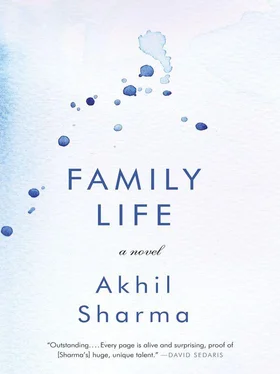“Why should I have any shame?” I shouted once I was naked.
My mother was near the foot of the bed, embracing a folded towel. She looked at me stunned. This pleased me. We often sought to show that there was no limit to what we would say or do.
After a moment, my mother wagged her head from side to side. “If Birju were all right, I would tell you to get out. I’d tell you to leave right now. Go with your stupid grades and die.”
I was not going to let her have the last word. “How can they be stupid when they’re so high?”
WHILE MY FATHER’S drinking was getting so bad that he hardly helped and my mother and I were fighting every day, my family was also becoming more and more famous. This was not only because my good grades had brought another level of attention to us, but also because the community was growing and so there were simply more people to give attention.
A large apartment complex, a row of brown brick buildings called Hilltop Apartments, had opened along a wide, busy road about a mile away. Almost all of the people who lived in Hilltop were Indians, new arrivals. Riding on the school bus, I often saw them walking along the sides of roads because they didn’t have cars. At temple, the women from Hilltop, women who worked at Kmart and grocery stores, carried see-through plastic purses. These people began visiting us. Many of them spoke neither Hindi nor English. When they came, they brought coconuts and bananas as if they were visiting an actual temple. Usually they said nothing or only the few words of Hindi that they knew: namaste, beta, khush. Some of the women came into Birju’s room, gripped his feet with both hands, and bowed and touched their foreheads to his feet.
My father was now drinking all night long. Many nights, I woke at three or four in the morning from hearing him coming down the hallway. The upstairs bathroom was next to my room. My father kept a bottle of scotch beneath the bathroom sink. If the creaking of the hallway floor didn’t wake me, the buzz of the fluorescent tube light turning on did.
The wood of the bathroom door was swollen. One night, I heard the door being pulled close. I lay in bed and, unable to go back to sleep, became enraged.
I left my room and came out into the dark hallway. A line of white light shone beneath the bathroom door. I wanted to shout at my father. I knocked. “Who?” my father said in a slurred voice.
“Can I come in?”
I pushed the door. My father was standing by the window. He was wearing gray pajamas. His face was sagging, and his eyes were dilated. The window was open, and a moist spring breeze was blowing in.
There was something about the reality of seeing my father’s loose face that made me stop being angry. “How are you, Daddy?” I asked.
“I am so happy,” he answered. He was smiling.
ANOTHER MORNING I woke to the sound of my mother’s voice shouting with what sounded like alarm, and I hurried to my parents’ room.
“You are going to lose your job,” my mother cried. She was standing at the foot of the bed while my father lay before her.
“They’re all like me, Shuba,” he slurred. “It’s a government office.”
“We won’t have insurance! Birju will be thrown out on the street.”
“I’m union. They say, ‘Come to a meeting.’ I answer, ‘Is there food? I only go to meetings with food.’”
My father was almost always late for work. Sometimes he left the house at noon. Sometimes he missed a day. Coming home from school, I would see his station wagon in the driveway, and my chest would tighten. I would walk into Birju’s room, see my mother sitting by the exercise bed reading to Birju, and her face would be grim. I would keep to myself, then, because I didn’t want her shouting at me. I’d go upstairs to my room and sit at my desk and read Hemingway. Hemingway had been an alcoholic and his characters often drank too much. Their drinking appeared false, though, because there were no consequences. It was like how cartoon characters fall off cliffs without being injured. Spotting this lie in Hemingway made me feel superior to him, and this bit of superiority led me to feel anger and contempt and being angry was pleasurable.
At some point, my father began missing one or two days of work a week. He was put on probation. He told my mother that he sat in an office with his supervisor, his union representative, and a very fat man who was the human resources person. He signed a piece of paper to document that he had been notified of the complaint.
When he had signed the paper, his supervisor said, “I don’t care if you show up drunk. You just have to come to work.”
“That’s not what he means,” the fat man murmured.
My father was not going to be told what to do. “You want to show you have power,” he shouted at his supervisor. “I know you.”
When she heard this, my mother said, “They do have power.”
“I am not going to be a slave, Shuba. Not for you. Not for Birju.”
“Always you find a way to bring in Birju.”
A few days later, I came home from school, and my father was sitting at the kitchen table. He had his back to the window. He was trying to drink tea. His hands were shaking.
My mother stood by the table. “Your father is going to stop drinking.” I wondered if I was expected to pretend to believe this. We went to Birju’s room. Birju had thick acne on his cheeks now as a side effect of one of his medications. The acne was as thick as bubbled paint, but because one was not expecting it, at first glance, he appeared to have rosy cheeks.
My father put a hand on Birju’s head. He swore on Birju’s life that he would not drink. I saw this and thought I was watching some melodrama that my parents had concocted.
“We have to help him,” my mother said to me. She said that my father was able to not drink on his own during the day. At night, though, the desire to drink was too much. He could not sleep without drinking.
That night, after Birju had received his oral feeding, the three of us sat around his hospital bed playing cards until the nurse’s aide came. When my father climbed the stairs, my mother and I followed. My mother carried a thermos of tea, and I held a tray before me. The tray was covered in plates of biscuits and sweets and bowls of nuts and various types of salty fried dough.
In the bedroom, my mother flipped on the light switch by the door. She turned on the lamps that stood on the nightstands. The room became bright. There was a mirror on top of the dresser, and our reflection in this and the reflections in the windows made the room seem crowded. Pointing the remote control, she flicked on the TV. The noise added to the sense of busyness.
We sat on my parents’ bed and played cards with the plates spread around us. My father sat cross-legged, head bowed, looking hopeless.
My mother asked me about school.
“It will be harder to be ranked first this year than last,” I said, angry that I was being asked to engage in this foolishness.
“Already making excuses.”
“It will be harder. Each year, it’s harder.”
The hours passed. Around two that night, my mother got tired. She turned to my father. “Do you feel sleepy?”
“No.”
She put a videotape in the VCR. I cleared the bed of plates and cups. We turned off the lights and lay stretched on the bed, my father in the middle. The television shook its light over us.
My father didn’t drink that night. The next evening, around five, he called to say that he was leaving work and should be home by six. The fact that my father made sure he told us this seemed to indicate that he was trying not to drink.
This second night, too, I sat with my mother and father by Birju’s bed. And then at ten, we marched up the stairs with the tea and snacks.
Читать дальше












